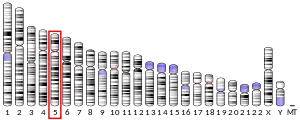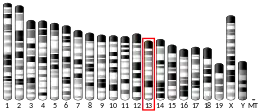SLC6A18
Solute carrier family 6, member 18 also known as SLC6A18 is a protein which in humans is encoded by the SLC6A18 gene.[5][6]
| SLC6A18 | |||||||||||||||||||||||||||||||||||||||||||||||||||
|---|---|---|---|---|---|---|---|---|---|---|---|---|---|---|---|---|---|---|---|---|---|---|---|---|---|---|---|---|---|---|---|---|---|---|---|---|---|---|---|---|---|---|---|---|---|---|---|---|---|---|---|
| Identifiers | |||||||||||||||||||||||||||||||||||||||||||||||||||
| Aliases | SLC6A18, Xtrp2, solute carrier family 6 member 18 | ||||||||||||||||||||||||||||||||||||||||||||||||||
| External IDs | OMIM: 610300 MGI: 1336892 HomoloGene: 40785 GeneCards: SLC6A18 | ||||||||||||||||||||||||||||||||||||||||||||||||||
| |||||||||||||||||||||||||||||||||||||||||||||||||||
| |||||||||||||||||||||||||||||||||||||||||||||||||||
| |||||||||||||||||||||||||||||||||||||||||||||||||||
| |||||||||||||||||||||||||||||||||||||||||||||||||||
| |||||||||||||||||||||||||||||||||||||||||||||||||||
| Wikidata | |||||||||||||||||||||||||||||||||||||||||||||||||||
| |||||||||||||||||||||||||||||||||||||||||||||||||||
Function
The SLC6 family of proteins, which includes SLC6A18, acts as specific transporters for neurotransmitters, amino acids, and osmolytes like betaine, taurine, and creatine. SLC6 proteins are sodium cotransporters that derive the energy for solute transport from the electrochemical gradient for sodium ions.[6][7]
Clinical significance
Mutations in the SLC6A18 gene are associated with iminoglycinuria.[8]
References
- GRCh38: Ensembl release 89: ENSG00000164363 - Ensembl, May 2017
- GRCm38: Ensembl release 89: ENSMUSG00000021612 - Ensembl, May 2017
- "Human PubMed Reference:". National Center for Biotechnology Information, U.S. National Library of Medicine.
- "Mouse PubMed Reference:". National Center for Biotechnology Information, U.S. National Library of Medicine.
- Strausberg RL, Feingold EA, Grouse LH, et al. (December 2002). "Generation and initial analysis of more than 15,000 full-length human and mouse cDNA sequences". Proc. Natl. Acad. Sci. U.S.A. 99 (26): 16899–903. Bibcode:2002PNAS...9916899M. doi:10.1073/pnas.242603899. PMC 139241. PMID 12477932.
- Höglund PJ, Adzic D, Scicluna SJ, Lindblom J, Fredriksson R (October 2005). "The repertoire of solute carriers of family 6: identification of new human and rodent genes". Biochem. Biophys. Res. Commun. 336 (1): 175–89. doi:10.1016/j.bbrc.2005.08.048. PMID 16125675.
- "Entrez Gene: SLC6A18".
- Bröer S, Bailey CG, Kowalczuk S, Ng C, Vanslambrouck JM, Rodgers H, Auray-Blais C, Cavanaugh JA, Bröer A, Rasko JE (November 2008). "Iminoglycinuria and hyperglycinuria are discrete human phenotypes resulting from complex mutations in proline and glycine transporters". J. Clin. Invest. 118 (12): 3881–92. doi:10.1172/JCI36625. PMC 2579706. PMID 19033659.
Further reading
- Guey LT, García-Closas M, Murta-Nascimento C, et al. (2010). "Genetic susceptibility to distinct bladder cancer subphenotypes". Eur. Urol. 57 (2): 283–92. doi:10.1016/j.eururo.2009.08.001. PMC 3220186. PMID 19692168.
- Eslami B, Kinboshi M, Inoue S, et al. (2006). "A nonsense polymorphism (Y319X) of the solute carrier family 6 member 18 (SLC6A18) gene is not associated with hypertension and blood pressure in Japanese". Tohoku J. Exp. Med. 208 (1): 25–31. doi:10.1620/tjem.208.25. PMID 16340170.
- Singer D, Camargo SM, Huggel K, et al. (2009). "Orphan transporter SLC6A18 is renal neutral amino acid transporter B0AT3". J. Biol. Chem. 284 (30): 19953–60. doi:10.1074/jbc.M109.011171. PMC 2740421. PMID 19478081.
- Gerhard DS, Wagner L, Feingold EA, et al. (2004). "The status, quality, and expansion of the NIH full-length cDNA project: the Mammalian Gene Collection (MGC)". Genome Res. 14 (10B): 2121–7. doi:10.1101/gr.2596504. PMC 528928. PMID 15489334.
- Ota T, Suzuki Y, Nishikawa T, et al. (2004). "Complete sequencing and characterization of 21,243 full-length human cDNAs". Nat. Genet. 36 (1): 40–5. doi:10.1038/ng1285. PMID 14702039.
- Kleta R, Romeo E, Ristic Z, et al. (2004). "Mutations in SLC6A19, encoding B0AT1, cause Hartnup disorder". Nat. Genet. 36 (9): 999–1002. doi:10.1038/ng1405. PMID 15286787. S2CID 155361.
- Bröer S (2008). "Amino acid transport across mammalian intestinal and renal epithelia". Physiol. Rev. 88 (1): 249–86. doi:10.1152/physrev.00018.2006. PMID 18195088.
- Yoon YH, Seol SY, Heo J, et al. (2008). "Analysis of VNTRs in the solute carrier family 6, member 18 (SLC6A18) and lack of association with hypertension". DNA Cell Biol. 27 (10): 559–67. doi:10.1089/dna.2008.0755. PMID 18554081.
This article incorporates text from the United States National Library of Medicine, which is in the public domain.
This article is issued from Wikipedia. The text is licensed under Creative Commons - Attribution - Sharealike. Additional terms may apply for the media files.



